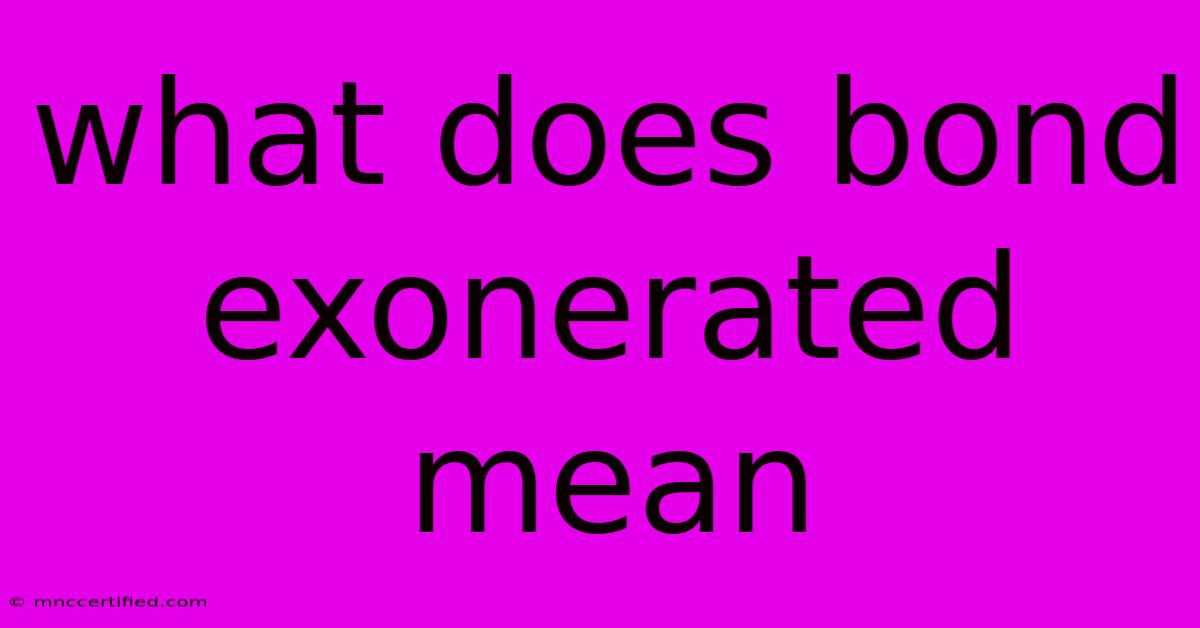What Does Bond Exonerated Mean

Table of Contents
What Does Bond Exonerated Mean? A Comprehensive Guide
Understanding legal terminology can be challenging, especially when dealing with complex processes like bail bonds. One term that often causes confusion is "bond exonerated." This article will break down the meaning of "bond exonerated," explaining its implications and the steps involved.
Understanding Bail Bonds and Their Purpose
Before diving into the meaning of "bond exonerated," let's establish a foundational understanding of bail bonds. A bail bond is a financial guarantee ensuring a defendant's appearance in court. It's a promise to pay a specific amount of money if the defendant fails to comply with court-ordered conditions, such as attending all hearings and adhering to specific restrictions.
There are several types of bail bonds, including:
- Surety bonds: These involve a bail bondsman who posts the bond on the defendant's behalf, typically for a fee.
- Cash bonds: The defendant pays the full bail amount in cash.
- Property bonds: The defendant uses real estate as collateral.
- Unsecured bonds: The defendant is released without posting any money or property, but is obligated to appear in court.
What Does "Bond Exonerated" Mean?
The phrase "bond exonerated" signifies that the financial guarantee provided by the bail bond has been officially released and discharged. This means the surety (the person or entity who posted the bond) is no longer liable for the bond amount. The bond is considered fulfilled and the obligation is extinguished.
In simpler terms: The court has declared that the defendant has fully met the conditions of their release and the bond is no longer needed. The money, or the collateral, is returned.
When Does a Bond Become Exonerated?
A bond becomes exonerated under various circumstances, including:
- Successful completion of the court proceedings: The defendant attends all scheduled hearings, complies with all conditions of release, and the case concludes.
- Dismissal of charges: If the charges against the defendant are dropped, the bond is typically exonerated.
- Acquittal: If the defendant is found not guilty after a trial, the bond is exonerated.
- Successful completion of probation or parole: In some cases, a bond might be tied to probation or parole; successful completion will lead to exoneration.
The Process of Bond Exoneration
The process of bond exoneration varies depending on the jurisdiction and the type of bond. Generally, it involves:
- Court Confirmation: The court must officially confirm the fulfillment of all conditions related to the bail bond.
- Filing of Necessary Paperwork: Specific paperwork, often initiated by the defendant's attorney or the bail bondsman, needs to be filed with the court.
- Release of Funds or Collateral: Once the court confirms exoneration, the funds or collateral used to secure the bond are released to the appropriate party. This may take some time depending on the court’s processing.
What Happens if the Bond is Not Exonerated?
If a defendant fails to appear in court or violates the conditions of their release, the bond is forfeited. This means the surety becomes responsible for paying the full bail amount. The surety should immediately contact their legal representative and the court to discuss the implications.
Key Takeaways: Understanding Bond Exoneration
- Exonerated means the bail bond obligation is released and fulfilled.
- Various circumstances can lead to a bond being exonerated, including successful completion of court proceedings, dismissal of charges, or acquittal.
- A formal process is typically involved, including court confirmation and paperwork filing.
- Failure to meet conditions results in bond forfeiture, with the surety responsible for the full amount.
Understanding the meaning and process of bond exoneration is crucial for both defendants and those who post bail on their behalf. If you have any questions or are facing a situation involving bail bonds, it's essential to seek legal advice. This information is for educational purposes and not legal advice. Consult with a legal professional for guidance on your specific situation.
Keywords: bond exonerated, bail bond, surety bond, cash bond, property bond, unsecured bond, court proceedings, dismissal of charges, acquittal, probation, parole, bond forfeiture, legal terminology, legal advice.

Thank you for visiting our website wich cover about What Does Bond Exonerated Mean. We hope the information provided has been useful to you. Feel free to contact us if you have any questions or need further assistance. See you next time and dont miss to bookmark.
Featured Posts
-
Death Of Hannah Kobayashis Father In La
Nov 26, 2024
-
Clear Street Investment Banking
Nov 26, 2024
-
Ronaldos Two Goals Power Al Nassr
Nov 26, 2024
-
Judges Decision Menendez Brothers Fate
Nov 26, 2024
-
Russian Forces Capture British Soldier In Ukraine
Nov 26, 2024